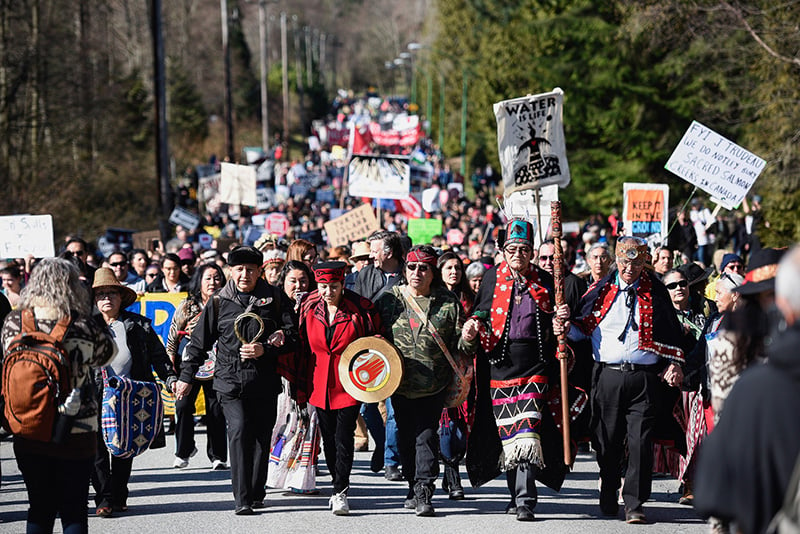The “Protest Papers” released by the BC Civil Liberties Association are just the latest chapter in a five-year battle to determine if CSIS and the oil and gas industry are illegally spying on citizens’ groups.
The thousands of pages of documents, even in their heavily redacted form, suggest CSIS — the Canadian Security Intelligence Service — spied on opponents of the now-defunct Enbridge Northern Gateway Pipeline, including Indigenous groups. And the spy agency shared the intelligence with oil companies and the National Energy Board.
Alexandra Woodsworth, spokeswoman for Dogwood BC, one of the groups, called the surveillance and monitoring “a shocking betrayal” of peoples’ trust in their government.
“Our tax dollars are being used to spy on people on behalf of the fossil fuel companies,” she told Glacier Media.
What does this mean for those resisting pipelines like Coastal GasLink, which would bring fracked gas to Kitimat LNG plants? Or the Trans Mountain Expansion Project to bring greater amounts of bitumen to the Lower Mainland from Alberta’s oilsands?
A history of spying on Indigenous and anti-pipeline groups
Sadly, no one should be surprised that the RCMP and CSIS spy on Indigenous and anti-pipeline groups. They’ve been doing it for a long time.
University of New Brunswick sociologist Tia Dafnos, who has researched the topics, told the National Observer that since 2005 Natural Resources Canada has hosted twice-yearly classified briefings with CSIS, the RCMP and energy company executives at the CSIS headquarters in Ottawa. The briefings continue to this day.
After Stephen Harper was elected in 2006, Indigenous and Northern Affairs Canada was given a lead role in spying on Indigenous protesters, according to the National Observer. And an Indigenous Affair report said it shared “intelligence” with the RCMP, CSIS, Transport Canada and Natural Resources Canada and would hold weekly conference calls to discuss pipeline resistance activity like blockades and occupations.
That same year, in 2007, the RCMP formed the Aboriginal Joint Intelligence Group, which called itself a “central repository” of information on Indigenous protest activity. The group used field operatives to gather its intelligence and shared information with 450 recipients in law enforcement, government and “industry partners.” The RCMP says it dismantled the group in 2010. “However, we cannot confirm that RCMP divisions are not performing Aboriginal JIG activities under another name or program,” it said in a statement.
In November 2013, documents under the Access to Information Act and Privacy Act showed the National Energy Board, ostensibly an independent regulatory agency, co-ordinated with CSIS, the RCMP and oil companies to monitor anti-pipeline organizers and groups.
The documents revealed a law enforcement emphasis on pipeline opposition in British Columbia.
The 2013 disclosure led the BCCLA to file complaints in February 2014 alleging that CSIS and the RCMP “monitored and spied on the peaceful and democratic activities of community groups and First Nations opposed to the Enbridge Northern Gateway Pipeline project.” The complaint identified the Dogwood Initiative, ForestEthics (now Stand.earth), Sierra Club BC, Leadnow.ca and the Indigenous-led Idle No More movement as targets.
In its complaints, the BCCLA argued that the law forbids CSIS from gathering information on civilians unless reasonable grounds exist to suspect they’re a risk to national security.
What’s behind the Protest Papers?
The thousands of pages released by the BC Civil Liberties Association were the result of that five-year-old complaint.
The 2014 complaints were reviewed by the Security Intelligence Review Committee, an independent federal agency that is supposed to act as a CSIS watchdog. In 2015, SIRC held closed-door hearings in Vancouver and heard testimony from members of the organizations that brought the complaints.
But the intelligence watchdog rejected the complaints in 2017, and the BCCLA is challenging its findings in federal court.
Late last year the Canadian Press obtained a redacted copy of the Security Intelligence Review Committee report, which acknowledged that “ancillary information” may have been gathered on people CSIS did not intend to target, and admitted that a “chilling effect” on pipeline resistance efforts may have occurred.
But the report ultimately concluded that CSIS did not violate its mandate or break any laws. It also concluded that the security agency did not share information about Indigenous and environmental groups named in the complaints with the NEB or members of the petroleum industry.
The BC Civil Liberties Association disputes these conclusions.
“People can look at these documents and decide for themselves,” said Meghan McDermott, staff lawyer at the BCCLA. “If CSIS claims it wasn’t tracking conservation groups in B.C., why did they collect thousands of pages of files relating to groups who engaged in peaceful advocacy and protest?”
Can we trust CSIS and its watchdog?
The long history of RCMP and CSIS surveillance of activists is enough to raise concerns.
But so does the Security Intelligence Review Committee’s handling of the complaints.
The SIRC report was drafted by Yves Fortier, a former board member of TransCanada, the company building the Keystone XL pipeline from Alberta to Texas. When the BCCLA asked Fortier to recuse himself from the investigation, he refused.
A statement from Public Safety Minister Ralph Goodale after the release of the Protest Papers said he couldn’t comment on the case. New legislation on national security, Bill C-59, “makes very clear that advocacy and protest do not constitute security threats,” the statement said. The legislation which took effect in June, “has strengthened transparency and the review process has been fortified,” the statement said.
But SIRC labelled its report on the BCCLA complaints “Top Secret” and continues to oppose disclosure of documents, including obtaining a sweeping seal of secrecy on evidence it heard in the original investigation. Witnesses from Indigenous and environmental groups who testified behind closed doors at the 2015 SIRC hearings are forbidden from ever sharing publicly what they said, heard or saw at the hearings.
BCCLA lawyer Paul Champ says that’s wrong. “When the court hearing deals with allegations of government misconduct, it is more important than ever for the public and the press to be allowed to see and hear what is said,” he said.
What about private security surveillance?
Even if CSIS curbs its activities, private security forces can continue to spy on Indigenous and anti-pipeline groups and share the information with the spy organization, law enforcement and regulators.
Jeffrey Monaghan, a Carleton University criminology professor and author of Policing Indigenous Movements, says little is known about the intelligence-gathering practices of private investigators or the security divisions of the energy corporations.
Private investigators have far greater flexibility in how they gather information and much less oversight than their law enforcement counterparts, he said in an interview last year.
“What we do know is that over the past few years the federal government has made a fairly substantive effort to try to integrate these private companies, especially the resource companies and their security wings, into the national security bureaucracy,” said Monaghan.
The RCMP operates a web portal that allows corporations involved in “critical infrastructure” to upload protest information as part of “suspicious incident reporting.”
Industry investigators infiltrate protest
On May 25, 2018, just days before Trudeau announced the federal government’s intention to buy the Trans Mountain pipeline, two security officers hired by Kinder Morgan infiltrated a group of anti-pipeline protesters organized under the umbrella of the Protect the Inlet coalition. The group had staged a series of symbolic civil disobedience actions at the Trans Mountain facilities in Burnaby.
The two men worked for Kamloops-based Forsythe Security Consultants, reported Alastair Sharp and Dylan Sunshine Waisman in the National Observer.
Warren Forsythe is the owner of the security company and a 28-year veteran of the RCMP. Forsythe was joined that day by Terry Shendruk, a 33-year veteran of the RCMP and employee of Forsythe Security Consultants. Forsythe and Shendruk reported on their experiences among anti-pipeline organizers and activists to Trans Mountain site security manager Randall Marquardt, a 36-year veteran of the RCMP. Kinder Morgan used it in BC Supreme Court to win a ruling expanding the company’s anti-protest injunction.
Forsythe Security Consultants is just one of multiple security companies employed to keep tabs on Trans Mountain activists.
Jim Leyden is an Indigenous pipe carrier and longtime activist from the Vancouver Downtown Eastside who resides part-time at Kwekwecnewtxw, otherwise known as the Watch House. The house was built on the pipeline path to monitor work on the project.
For months, Leyden and others have been taking photos and videos documenting activities inside the Trans Mountain facility in Burnaby. They have accused the company of performing work in violation of the Federal Court of Appeal ruling and trying to conceal an oil spill.
Leyden says he has been filmed or photographed dozens of times while observing operations from the perimeter of the Trans Mountain tank farm.
In the fall of 2018, Leyden was documenting vehicle access at the Trans Mountain tank farm. Leyden says his lawyer was contacted by Crown counsel because Trans Mountain had asked the Crown to charge the activist with contempt for breaching the injunction while taking photographs. Leyden and his lawyer called their bluff and, ultimately, nothing happened.
Leyden had already been arrested and charged with criminal contempt for breaching the injunction. A trial for Leyden and two Indigenous co-defendants began last month in the BC Supreme Court and closing submissions will be heard on Sept. 20.
What now?
Whether or not the courts find that the government violated people’s charter rights by spying on them, Indigenous and environmental activists know surveillance and infiltration is taking place, and industry is working closely with police, private security and CSIS.
The BCCLA says it will continue to pursue its litigation to hold police and the intelligence community accountable. But meanwhile, the intelligence apparatus will continue to operate in near-complete secrecy and with impunity.
Indigenous and anti-pipeline groups have no choice but to recognize they could be under surveillance and act accordingly. They can either organize publicly and openly, CSIS and other so-called security operations be damned, or take precautionary measures to keep plans private and retain the element of surprise.
With tensions heating up as Trans Mountain expansion work is set to ramp up in the fall, activists wanting to keep the element of surprise will need to plan actions only with people they know, use encrypted communication tools and avoid social media. Police can seize and search people’s phones if they’re arrested, another factor to consider.
The federal government has acknowledged that surveillance may have had a “chilling effect” on citizens considering participating in pipeline protests.
In the coming months, we’ll see whether people are intimidated by government and industry spying. ![]()
Read more: Indigenous, Rights + Justice, Politics
















Tyee Commenting Guidelines
Comments that violate guidelines risk being deleted, and violations may result in a temporary or permanent user ban. Maintain the spirit of good conversation to stay in the discussion.
*Please note The Tyee is not a forum for spreading misinformation about COVID-19, denying its existence or minimizing its risk to public health.
Do:
Do not: